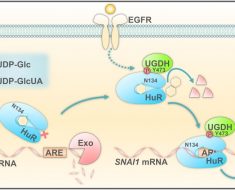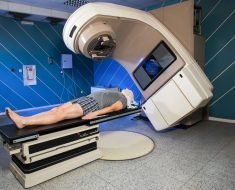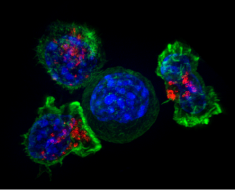Multiple adoptive transfers of T cells engineered to carry hepatitis B virus (HBV)-specific T cell receptors (TCRs) has resulted in an objective positive response in a patient with hepatitis B surface antigen (HBsAg)-negative HCC metastases in the lungs following liver transplant. The patient, described today in a presentation at The International Liver Congress 2018 in Paris, France, had a volumetric reduction of almost all lung lesions and no new lesions detected in the lung or liver.
HCC is the most common primary liver cancer and more than 50% of cases around the world are thought to be associated with chronic HBV., With a poor prognosis and limited therapeutic options, HCC is the second most common cause of cancer mortality worldwide. Liver transplantation is an option for some patients but HCC recurs in up to 20% of cases, with the lungs the most common site of metastases. Cytotoxic T cells play a key role in killing cancerous and infected cells when TCRs on their surface recognize short epitopes presented on the affected cell’s surface and initiate a series of cytotoxic mechanisms. In HBV-related HCC tumours, integrated HBV DNA can result in both oncogenic transformation and expression of HBV epitopes on the cell surface.
“We hypothesized that HBV transcriptomic profiles of HCC cells could guide the selection of HBV-specific TCRs to be used in engineering T cells for HCC-targeted immunotherapy.” explained Dr. Anthony Tan from the Emerging Infectious Diseases Programme at Duke-NUS Medical School in Singapore, the lead author of the study. “We first had to test if short, integrated HBV DNA fragments in tumour cells can produce HBV epitopes recognized by cytotoxic T cells.”
Characterization of the expression of short, specific regions of integrated HBV DNA in natural HBV-related HCC lines negative for serological markers of HBV infection identified HBV epitopes that were functionally presented on the cell surface. These HCC cells could be lysed in vitro by T cells engineered to express TCRs specific for the epitopes that had been identified. A similar analysis was able to identify a region of HBV envelope encoded by integrated HBV DNA fragments derived from the primary HCC of a liver transplant patient with HBsAg-negative HCC metastases in the lungs. The TCR specific for this HBV envelope region was introduced into T cells using mRNA electroporation. Multiple adoptive transfers of the resulting HBV-specific TCR T cells into the patient were performed over a period of 6 months.
No therapy-related adverse events were observed, and computed tomography imaging performed before and during therapy showed an objective positive response with a volumetric reduction of nearly all lung lesions detected, with no new lesions detected in the lung or liver to date. As of January 2018, the tumour lesions in the lung remain stable.
“The use of mRNA electroporation for exogenous TCR expression reduces the potential toxicity of this approach compared with previous techniques using viral vectors,” said Dr. Tan. “Further development of this new immunotherapeutic strategy may offer new hope of a cure for HCC.”
Source: Read Full Article





